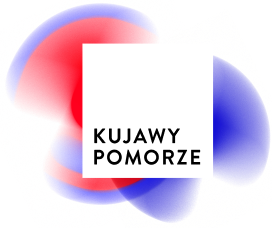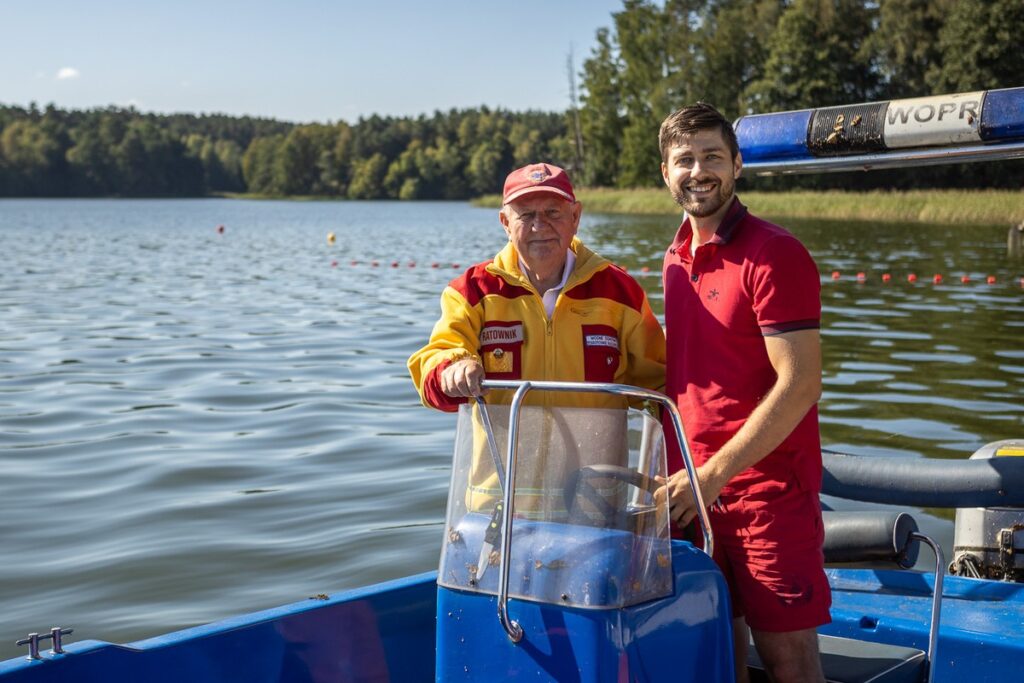
I can jump onto the boat without any problems!
We recall an archived conversation with Zdzisław Chudziński, a rescuer and trainer with the Volunteer Water Rescue Service for 60 years.
Do you remember your first rescue operation?
Yes, it was over forty years ago, in Chmielniki [on Lake Jezuickie]. I rescued an 8-year-old girl. The children were playing in the water, throwing mud balls at each other, and there was a drop-off in one place. The girl suddenly started drowning. Fortunately, she wasn’t underwater for long, and we managed to save her. She’s probably a happy grandmother now.
What event in your career do you remember most?
At the Wielonek resort on the Koronowski Lagoon, over 25 years ago, a man in a sailboat hit low-hanging high-voltage wires near the ferry with his mast. We resuscitated him for over 40 minutes, but unfortunately to no avail. Every year on the anniversary of this tragedy, his wife throws a wreath of flowers near the ferry. Stories like this stick in your memory.
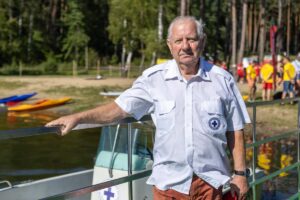
Zdzisław Chudziński, fot. Szymon Zdziebło/tarantoga.pl dla UMWKP
What advice do you have for those planning a holiday by the water? How to use bathing areas safely?
We should swim where there are lifeguards. We must keep our eyes open and be vigilant, especially when we are looking after children. Let’s look out for each other, react quickly and call for help when we witness dangerous situations.
On weekends, there are sometimes as many as 2,000 people on the beach in Borówno. Some are diving, others are jumping into the water, and in such a crowd it is difficult to spot someone who needs help. I won’t even mention swimming and alcohol consumption. Unfortunately, most of those who need help are ‘under the influence’.
How many people have you managed to save?
I have saved 12 people. However, this number does not include those who needed help but were able to stay afloat on their own. Now I mainly focus on training.
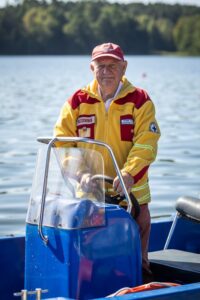
Zdzisław Chudziński, fot. Szymon Zdziebło/tarantoga.pl dla UMWKP
What advice do you give to newcomers who are just starting their adventure with water rescue?
To those who are just starting their work, I wish them humility above all else. It is also important to have some practice and to constantly train. You cannot be an effective rescuer without experience. There are more and more newcomers, which is good. In the past, training a rescuer was an expensive undertaking. For example, a scuba diving course cost PLN 5,000, and a motorboat helmsman course cost PLN 1,500. Not everyone could afford it, and a fully-fledged rescuer must have at least two licences. Since subsidies have been introduced, more and more people are willing to learn. Thanks to the subsidies, we have over 600 new young rescuers. We run motorboat courses on the Koronowski Lagoon, in Wielonek.
Are there any innovations or technologies that you think have revolutionised rescue services?
Definitely. Today, even resuscitation is performed differently. In the past, everything was done manually, including heart massage and artificial respiration. We only had Ambu bags [a colloquial term for self-inflating bags]. Now there are rescue defibrillators, which are easy to use and give voice commands. Even people without medical training can use them successfully. This is definitely a revolution.
How did your interest in rescue work begin, which later became an inspiration for your children and grandchildren?
In the army, anyone who could swim was sent on rescue courses. And since I was a competitive swimmer in Inowrocław, I also underwent training. I worked on military beaches and ships. I have been with WOPR since its inception in 1965. Before that, there was the Polish Swimming Association – Rescue Department. I have been involved in rescue work for 59 years, and I love this job.
I worked professionally until I was 60, initially at the Petroleum Products Headquarters, and later at Orlen. Thanks to the fact that CPN was located on the premises of the ‘Wielonek’ resort, I was the longest-serving lifeguard. The season lasted from 10 May to 10 October. If you like your job, there can only be one outcome.
I am also a proud father and grandfather of lifeguards.
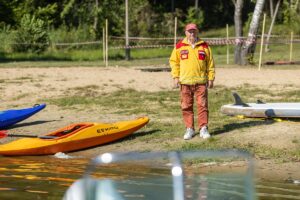
Zdzisław Chudziński, fot. Szymon Zdziebło/tarantoga.pl dla UMWKP
Where do you get your strength from?
Everyone wonders, even the trainees. I am over 80 and I can jump onto a motorboat without any problems, while others have to secure themselves and hold on, but I have no problem. I think it is thanks to my wife, who takes care of me and always takes me to the doctor, even though I feel very well. Besides, I like and eat fish.
* For his services to rescue work, Zdzisław Chudziński has received numerous awards, including the Silver and Bronze Cross of Merit of the WOPR, the Medal of Merit for the Development of Physical Culture, the Centenary of Independence Medal, and the 45th and 50th Anniversary Medals for his services to the WOPR. In 1987, Mr Zdzisław provided round-the-clock safety cover for kayaker Zdzisław Szubski, who was attempting to break the Guinness World Record by kayaking 252 kilometres down the Vistula River in 24 hours.
August 2024/July 2025

